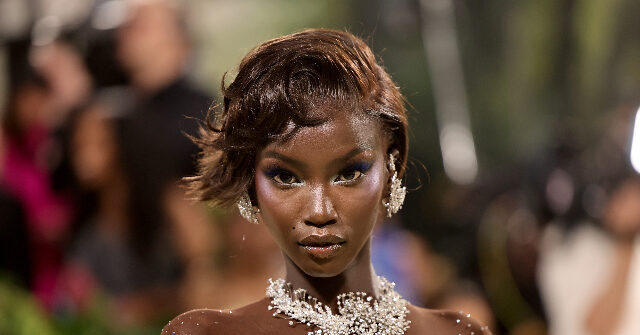Supermodel Anok Yai expressed her disappointment after not winning the Model of the Year award from the British Fashion Council for the second consecutive year. The accolade went to Alex Consani, a transgender model recognized for being the first transgender individual to partake in the Victoria’s Secret Fashion Show. Yai’s response to this outcome was notably vocal and emphatic; she took to her X account to share an iconic moment featuring Kanye West interrupting Taylor Swift at the 2009 MTV VMAs, which many interpreted as a clear sign of her dissatisfaction with the award decision. This incident highlights Yai’s feelings of exclusion within an industry that is increasingly navigating the complexities of identity and representation.
Following her initial post, Yai elaborated on her thoughts, addressing the British Fashion Council directly. She conveyed her exhaustion with the nomination process and firmly instructed that she not be nominated again in the future. In her message, Yai indicated her ongoing support for Consani, acknowledging her achievements while asserting her own feelings of fatigue stemming from the competition. This duality of emotions – pride for a fellow model yet exhaustion with the constant scrutiny and comparison – reflects the broader pressures faced by models of color, particularly within a space that often prioritizes a narrow definition of success.
Yai’s post included heartfelt sentiments towards Consani. Despite the competitive nature of the awards, she emphasized that admiration for each other does not diminish her own feelings. She expressed love and pride for Consani while also expressing her desire to extricate herself from the award race altogether. Yai’s assertiveness in stating “I don’t want it anymore” underscores her desire to shift focus away from competition and onto mutual support within the industry.
Anok Yai’s status in the modeling world is noteworthy, as she has carved out a successful career since her debut in 2017. She has graced many prestigious runway shows, participated in high-profile campaigns, and made headlines for her show-stopping Met Gala appearance adorned with an impressive 98,000 Swarovski crystals. Yai has also made history by being only the second black model to open a Prada show, showcasing her significant influence within high fashion. Nevertheless, her recent experience with the British Fashion Awards demonstrates that even models with prolific achievements can still feel the weight of industry expectations and biases.
The British Fashion Award has a legacy of honoring prominent figures in fashion, with past winners including notable names like Kate Moss and Cara Delevingne. This context adds to Yai’s feelings of disappointment, as she, too, has played a substantial role in the modern fashion landscape but still finds herself overshadowed in award ceremonies. The choice to award Consani instead raises questions about how the industry balances inclusivity with historical recognition and the impact of these decisions on established models.
In the wake of her controversy, Yai removed her posts, which might suggest a desire to quell any potential backlash or misinterpretations of her statements. The reinforcement of love and respect for fellow models such as Consani shows a shift towards solidarity instead of competition, advocating for a more communal environment in fashion. As models continue to navigate the complexities of identity, representation, and awareness of social issues, Yai’s experience serves as a compelling commentary on the challenges faced by women of color in the industry. Her call to the British Fashion Council presents a significant moment of self-awareness and personal agency in an environment often characterized by rivalry and comparison.

